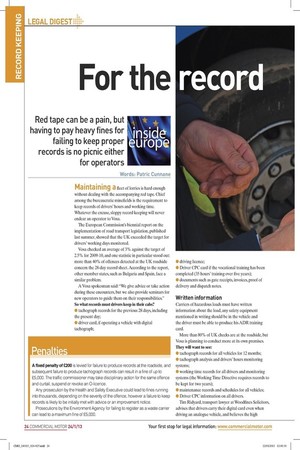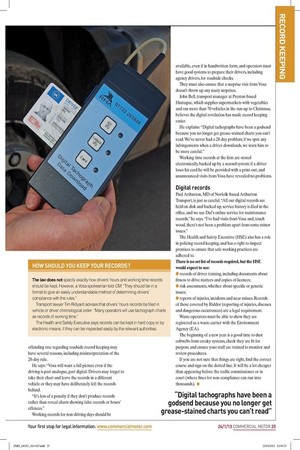For the Red tape can be a pain, but having to pay
Page 20

Page 21

If you've noticed an error in this article please click here to report it so we can fix it.
For the Red tape can be a pain, but having to pay heavy fines for failing to keep proper records is no picnic either for operators words: Patric Cunnane Maintaining a fleet of lorries is hard enough without dealing with the accompanying red tape. Chief among the bureaucratic minefields is the requirement to keep records of drivers' hours and working time. Whatever the excuse, sloppy record keeping will never endear an operator to Vosa.
The European Commission's biennial report on the implementation of road transport legislation, published last summer, showed that the UK exceeded the target for drivers' working days monitored.
Vosa checked an average of 3% against the target of 2.5% for 2009-10, and one statistic in particular stood out: more than 40% of offences detected at the UK roadside concern the 28-day record sheet. According to the report, other member states, such as Bulgaria and Spain, face a similar problem.
A Vosa spokesman said: "We give advice or take action during these encounters, but we also provide seminars for new operators to guide them on their responsibilities." So what records must drivers keep in their cabs?
• tachograph records for the previous 28 days, including the present day; • driver card, if operating a vehicle with digital tachograph; • driving licence; • Driver CPC card if the vocational training has been completed (35 hours' training over five years); • documents such as gate receipts, invoices, proof of delivery and dispatch notes.
Written information Carriers of hazardous loads must have written information about the load, any safety equipment mentioned in writing should be in the vehicle and the driver must be able to produce his ADR training card.
More than 80% of UK checks are at the roadside, but Vosa is planning to conduct more at its own premises. They will want to see: • tachograph records for all vehicles for 12 months; • tachograph analysis and drivers' hours monitoring systems; • working time records for all drivers and monitoring systems (the Working Time Directive requires records to be kept for two years); • maintenance records and schedules for all vehicles; • Driver CPC information on all drivers.
Tim Ridyard, transport lawyer at Woodfines Solicitors, advises that drivers carry their digital card even when driving an analogue vehicle, and believes the high offending rate regarding roadside record keeping may have several reasons, including misinterpretation of the 28-day rule.
He says: "Vosa will want a full picture even if the driving is part analogue, part digital. Drivers may forget to take their chart and leave the records in a different vehicle or they may have deliberately left the records behind.
"It's less of a penalty if they don't produce records rather than reveal charts showing false records or hours' offences."
Working records for non-driving days should be available, even if in handwritten form, and operators must have good systems to prepare their drivers, including agency drivers, for roadside checks.
They must also ensure that a surprise visit from Vosa doesn't throw up any nasty surprises.
John Bell, transport manager at Preston-based Huntapac, which supplies supermarkets with vegetables and ran more than 70 vehicles in the run-up to Christmas, believes the digital revolution has made record keeping easier.
He explains: "Digital tachographs have been a godsend because you no longer get grease-stained charts you can't read. We've never had a 28-day problem; if we spot any infringements when a driver downloads, we warn him to be more careful."
Working time records at the firm are stored electronically, backed up by a second system: if a driver loses his card he will be provided with a print-out, and unannounced visits from Vosa have revealed no problems.
Digital records Paul Arthurton, MD of Norfolk-based Arthurton Transport, is just as careful. "All our digital records are held on disk and backed up, service history is filed in the office, and we use Daf's online service for maintenance records," he says. "I've had visits from Vosa and, touch wood, there's not been a problem apart from some minor issues."
The Health and Safety Executive (HSE) also has a role in policing record keeping, and has a right to inspect premises to ensure that safe working practices are adhered to.
There is no set list of records required, but the HSE would expect to see: • records of driver training, including documents about fitness to drive matters and copies of licences; • risk assessments, whether about specific or generic issues; • reports of injuries, incidents and near misses. Records of those covered by Riddor (reporting of injuries, diseases and dangerous occurrences) are a legal requirement.
Waste operators must be able to show they are registered as a waste carrier with the Environment Agency (EA).
The beginning of a new year is a good time to dust cobwebs from creaky systems, check they are fit for purpose and ensure your staff are trained to monitor and review procedures.
If you are not sure that things are right, find the correct course and sign on the dotted line. It will be a lot cheaper than appearing before the traffic commissioner or in court (where fines for non-compliance can run into thousands). • A fixed penalty of £200 is levied for failure to produce records at the roadside, and subsequent failure to produce tachograph records can result in a fine of up to £5,000. The traffic commissioner may take disciplinary action for the same offence and curtail, suspend or revoke an 0-licence.
Any prosecution by the Health and Safety Executive could lead to fines running into thousands, depending on the severity of the offence, however a failure to keep records is likely to be initially met with advice or an improvement notice.
Prosecutions by the Environment Agency for failing to register as a waste carrier can lead to a maximum fine of £5,000.
HOW SHOULD YOU KEEP YOUR RECORDS?
The law does not specify exactly how drivers' hours and working time records should be kept. However, a Vosa spokesman told CM: "They should be in a format to give an easily understandable method of determining drivers' compliance with the rules."
Transport lawyer Tim Ridyard advises that drivers' hours records be filed in vehicle or driver chronological order: "Many operators will use tachograph charts as records of working time."
The Health and Safety Executive says records can be kept in hard copy or by electronic means, if they can be inspected easily by the relevant authorities.










































